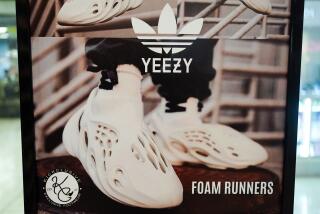THE BUSINESS OF THE OLYMPICS : Nike and Reebok Surmount Some Costly Hurdles : Advertising: The quest to win global recognition for their sportswear encountered numerous unexpected challenges.
- Share via
This year’s Summer Olympics may be remembered not only for demonstrations of athletic prowess, but also for the hurdles that Nike and Reebok surmounted as they peddled their sportswear from Barcelona.
The footwear giants launched multimillion-dollar marketing campaigns, hoping to win the gold medal with consumers. Yet their quests for global recognition, like that of some Olympic athletes, encountered numerous challenges.
The companies together are believed to have spent an estimated $50 million on Olympic advertising. Nike Inc. spokeswoman Liz Dolan disputes that figure, and says the company’s Olympic advertising is part of an ongoing campaign.
But Nike, best known for shoes designed for competition, clearly has spent millions to sponsor the U.S. track and field team and to buy the endorsement of the “Dream Team,” the U.S. men’s basketball squad, all but one of them professional players who got together specifically for the Olympics.
That campaign faced a daunting roadblock when a Spaniard who owns the Spanish trademark for the word “Nike” filed suit in the country’s constitutional court to prevent the Beaverton, Ore.-based company from selling or advertising its apparel--though not its shoes--in Spain.
Juan Amigo Freixas, who purchased the trademark from a Barcelona sock manufacturer that had registered a statue of the Greek goddess “Athena Nike” in 1932, said he also considered the uniforms worn by Nike-sponsored Olympic athletes to be illegal.
But as millions of television viewers can testify, Olympians continued to wear the company’s name and logo. Nike contends the uniforms are simply “the property of private individuals,” Dolan said.
The lawsuit did, however, force the company to alter a huge, six-story billboard painted in downtown Barcelona. The Nike name and logo was banished to the corner and off the uniforms worn by a pole-vaulting Sergei Bubka and a slam-dunking Michael Jordan.
Meanwhile, Reebok International Ltd. also turned a potential disaster into at least a neutral event.
Reebok, best known for its leisure shoes, began running a $25-million “Dan and Dave” television campaign last February. But the campaign nearly derailed after Dan O’Brien failed to qualify for the Olympic decathlon competition.
Reebok quickly turned out new ads with O’Brien prodding Dave Johnson, who did qualify and went on to win a bronze medal, to train harder for the Games. Advertising professionals called it a good save that painted O’Brien as a good sport and the company as a good comeback story.
Reebok’s plan to provide warm-up suits with the company’s logo to all U.S. athletes accepting medals also stirred controversy.
Some of the Dream Team superstars refused at first to wear them, claiming it could conflict with their highly lucrative endorsement contracts with Nike.
The matter ended with a compromise that advertising executives said might seem petty to U.S. consumers: The players will wear the suits, but turn down the collars so that the Reebok logo does not show.
More to Read
Go beyond the scoreboard
Get the latest on L.A.'s teams in the daily Sports Report newsletter.
You may occasionally receive promotional content from the Los Angeles Times.






